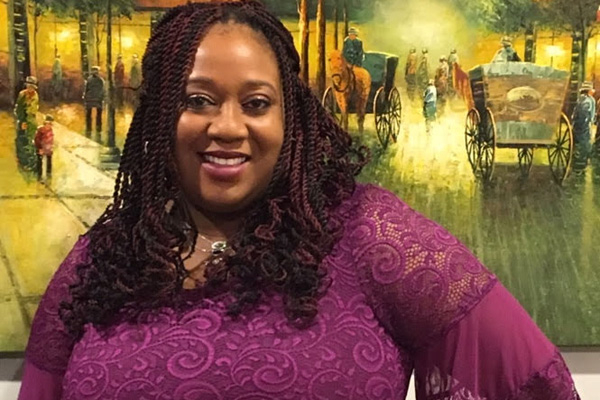Alumna Strives to Make a Difference for Juveniles in the Justice System
Jennifer Jones-Damis provides mental health services for 18-21-year-olds at Rikers Island

If Rutgers alumna Jennifer Jones-Damis could tear down the existing criminal justice system and design a new one from scratch, her first priority would be to create safe spaces for the youngest offenders populating the nation’s jails and prisons.
She would guarantee that juveniles working their way through the system are treated appropriately for their age – as people whose brains are still growing even as they deal with the results of poor decision-making.
Perhaps most importantly, she would drum into law-enforcement officials that traumas these young people have experienced affect their decisions and behaviors on a daily basis.
In a large way, the Rutgers graduate is helping to do all that now as she counsels inmates at the Rikers Island Correctional Facility as the mental health associate director of the facility’s Alternative to Solitary Confinement program.
“The old way of treating inmates in jail was all about punishment: make the environment so unbearable they will not want to come back to jail. That way does not work,” says Jones-Damis. “We are learning that we should aim to correct behavior so that individuals stop re-offending.”
Jones-Damis, who earned her doctorate in psychology in 2013 from the Graduate School of Applied and Professional Psychology (GSAPP) at Rutgers University-New Brunswick, works with inmates ranging from 18 to 21 at the Rikers facility.
Additionally, she conducts workshops and training sessions for corrections officers, probation officers and other law-enforcement personnel throughout the country.
In 2015, New York City banned the practice of isolating offenders under 21 for disruptive behavior – fighting with each other, for example, or assaulting staff members. The new policy reflected a growing body of evidence that such harsh measures lead to an increased risk of suicide and depression, especially among young people.
“Our program tries to do more than punish – it looks at what drove the behavior in the first place. The therapy is specifically targeted to making better decisions.”
As an alternative, Rikers officials developed what they dubbed Transition Restorative Units, designed to provide individual and group therapy for youthful inmates held on the 413-acre island, situated between the boroughs of Queens and Bronx, that houses New York City’s main jail complex.
“Our program tries to do more than punish – it looks at what drove the behavior in the first place,” says Jones-Damis, who commutes an hour and a half each way from her home in Sayreville to her workplace. “The therapy is specifically targeted to making better decisions.”
She realizes she can’t expect to see profound changes in the time her clients usually remain at Rikers. But she takes comfort in knowing she’s made a start.
Don’t forget, Jones-Damis says, these are young men who have watched friends being murdered, who have seen and endured violence and abuse in the home, who have experienced some of the worst society has to offer.
Because many never have had the opportunity to speak with a trained counselor, she spends a huge chunk of time chipping away at the perceived stigma of seeking help, assuring the young men sitting in front of her on a chair bolted to the day-room floor that yes, it’s all right to talk with a mental-health professional.
As tough as her job is, Jones-Damis has success stories to share about making a difference in the lives of the inmates. These include an 18-year-old charged with murder who, despite a difficult life, was a straight-A student before he was in jail.
She counseled him weekly after he was put on a suicide watch. The young man worked hard enough at therapy, and at his studies, to earn his diploma at Rikers High School – as valedictorian.
In a March 18 interview with National Public Radio, a former head of New York City’s correctional health services described the brutal – and brutalizing – experience he believes thousands of inmates of the facility have endured.
“What’s important to consider about jail settings is that they are incredibly dehumanizing, and they dehumanize the individuals who pass through them,” Homer Venters said. “This is not really a true respect for the rights of the detained.”
While working toward her doctorate at Rutgers, the Roselle native seized the opportunity to serve in an internship at a correctional facility in northern Wisconsin, where she conducted psychological testing, individual therapy and group therapy. While there, she also created a program to help girls develop life skills.
This first exposure to interacting with youths in a juvenile setting persuaded her that conventional therapy can only go so far to meet their needs – intensive training in trauma therapy is more effective.
Putting that conviction into action, Jones-Damis went on to pursue a post-doctoral position at Mount Sinai-Beth Israel teaching hospital in Manhattan, where she explored trauma’s effects on young lives, facilitated groups for trauma survivors and trained social workers to address issues particular to this peer group.
Today, in addition to her work at Rikers, the GSAPP alumna serves as co-chair of the Justice Consortium of the National Child Traumatic Stress Network.
The network, funded by SAMSA, the Substance Abuse and Mental Health Services arm of the U.S. Department of Health and Human Services, meets monthly to review trends in juvenile justice and compile fact sheets for judges and others who deal with young people interacting with the criminal-justice system.
“Through my work, I strive to change the lens through which officers and staff look at these young men, from ‘bad youth’ to ‘youth who have had bad things happen to them,’ “Jones-Damis says. “I also try to instill hope in these young men so they know their past does not have to define their future.”